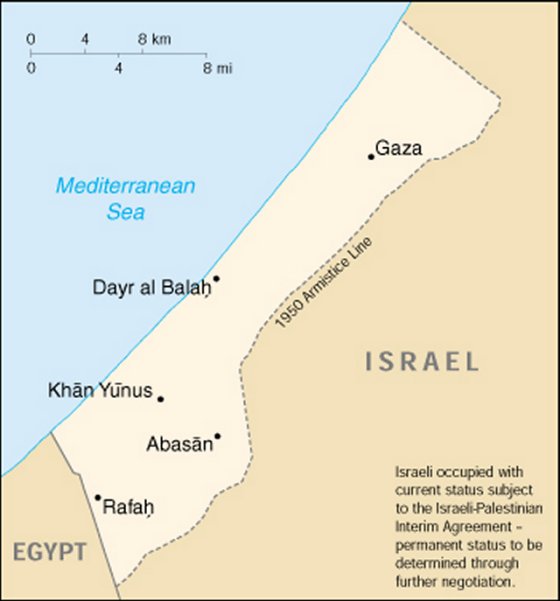Gaza’s “Ghost” Suicide Bombers – More Rhetoric than Threat?
Publication: Terrorism Focus Volume: 6 Issue: 2
By:

Recently, Islamic and jihadi internet forums circulated an article entitled “The Ghost suicide bombers. Who are they? And how do they spend their day?” (hanein.info, January13). The posting, written by the Gaza correspondent for the influential Doha-based Islamonline website, included a short interview with the trainers of Hamas’ suicide bombers (Islamonline.net, January 12).
Islamonline’s correspondent, Muhammad al-Sawaf, said the suicide bombers, known as “Ghosts” to other Gaza militants, are the first line of defense in Gaza. They spend up to 48 hours at a time in ditches, reciting verses from the Quran while waiting for Israeli forces to pass by in order to blow them up. The bombers belong to the military wing of the Izz al-Din al-Qassam battalions of Hamas. Abu Moath, an al-Qassam leader supervising the suicide bombers, said the bombers are very determined individuals chosen carefully by Hamas: “They live like any other pious Palestinian youth. Some of them are university students that go about their lives without raising unwanted attention or bragging about their end mission. They go through a special faith program.”
Since the start of the conflict in Gaza, the “ghost” suicide bombers have isolated themselves from families and friends. They spend their time hidden close to areas where Israeli forces deploy. On the selection criteria for suicide bombers, Abu Moath briefly explained that only young people are chosen from the ranks of al-Qassam’s battalions, which number up to ten thousand fighters. Abu Moath disclosed females are also recruited to the ranks of the suicide bombers. The candidate bombers are secretly scrutinized by al-Qassam lieutenants to make sure they are religiously committed and responsible. The next phase is to notify the bomber of their acceptance and put them through psychological and military training on weapons and tactics, especially those used by the Israeli Defense Force (IDF). Abu Moath asserts that all through the selection and training phases the suicide bombers are tutored by religious clerics and Islamic preachers. Upon completion of training, the bombers are sent behind enemy lines. Each group of suicide bombers is compartmentalized and does not know the location or composition of other groups to avoid compromising their comrades if one of them is captured by the Israelis. Abu Moath admits such captures happen very often because the suicide bombers operate behind enemy lines. Each suicide bomber is issued special weapons and a custom-tailored explosive belt.
Other Hamas units of suicide bombers include the “Booby-Trapped Martyrs.” These martyr units are designed to deploy on the streets and alleys of Gaza’s cities, armed with heavier explosive belts than those used by the “ghosts.” These units are as secret and compartmentalized as the “ghost” suicide bombers and deploy with Hamas commando units tasked with kidnapping Israeli soldiers.
Many forum chatters hailed and prayed for the “ghost “ and “martyr” suicide bombers, posting comments such as: “It is only my lack of luck that I am not with them. I wish them all the best in this life and hereafter. May God give them steadfastness and determination, amen.”
In another interview by Islamonline correspondent al-Sawaf, al-Qassam Brigades spokesman Abu Obeida said Hamas fighters have surprised the Israeli forces with offensives attacks rather than the expected defensive operations. He said the suicide-bomber Mahmoud al-Rifi, whom he claimed stayed for days in a ditch on the al-Raes mountain west of Gaza city and blew up an Israeli commando unit, was one example of Hamas’ successful new guerilla warfare tactics. However, other sources said al-Rifi did not carry out a suicide attack; rather, he waited for Israeli forces in a ditch on the al-Raes mountain and attacked a detachment of Israeli commandos with a machine gun, killing two Israeli soldiers before being killed while trying to take a third injured soldier prisoner (muslm.net January 9).
According to earlier threats by Hamas leaders, Hamas is expected to resume suicide bombing attacks in Israeli cities in retaliation for the war on Gaza. Regardless of the Israeli wall built to prevent suicide bombers from entering Israel, Hamas leaders allege they have managed to infiltrate tens of their suicide bombers who are already in place in Israel and the West Bank awaiting orders (alrainews.com, December 22, 2008). Even though Hamas has enough experience and possible accomplices among Palestinians living in Israel to resume suicide attacks in Israeli cities, Israeli forces demonstrated their ability to prevent suicide attacks in the assault on Gaza. The absence of successful suicide attacks on Israeli forces in the conflict is likely an indication of Hamas’ inability to recruit enough volunteers to perpetrate suicide bombings, regardless of whatever claims are made by the Hamas leadership.





